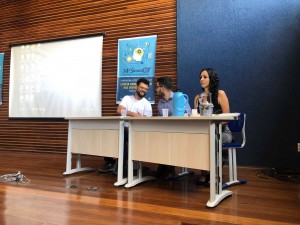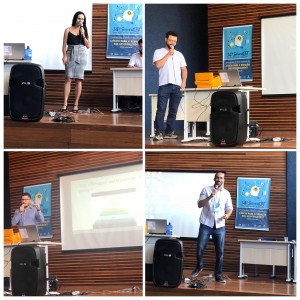CEFET-MG Campus Contagem sediou o I English: The Language of Science
Segunda-feira, 22 de outubro de 2018
Durante a 14ª Semana de Ciência e Tecnologia o CEFET-MG Campus Contagem sediou o I English: The Language of Science. O evento foi realizado no formato de mesa-redonda e contou com palestras de três áreas distintas ministradas em língua inglesa. Além de terem contato com assuntos que fogem ao currículo escolar, os alunos tiveram a oportunidade de vivenciar um contexto no qual a comunicação foi realizada apenas em língua estrangeira. Além disso, as palestras foram seguidas de uma discussão sobre os temas da palestra e sobre a importância do inglês na vida pessoal e na vida profissional dos palestrantes. Dessa forma, o evento não apenas propiciou um contexto de uso real da língua inglesa, mas também evidenciou a importância que essa língua tem nos dias de hoje. Abaixo, apresentamos as informações do eventos no formato que elas foram repassadas aos participantes, ou seja, em língua inglesa:
English: The Lang uage of Science
uage of Science
This round-table aims at providing participants with the opportunity to learn about different areas of science through presentations in English. Furthermore, the specialists from these different areas will discuss the importance of English in their professional and personal life.
Mediator: Prof. Dr. Cândido Samuel Fonseca de Oliveira (CEFET-MG)
Invited Speakers:
Profª. Talita Camila Gonçalves Nunes (UFMG)
The precarization of the teleworking: technological slavery and impacts on the physical and mental health of the worker Technological advances reorganize production mode and telecommuting comes of this reengineering.
The model uses the tools of information and communication technologies (ICT´s) and operates at a distance in different modalities. However, precarious forms of remote work arise, in particular the exhaustive journey, hypothesis of slave labor, still in force in art. 149 of the Brazilian Criminal Code. The research has proposed removing the veil of flexibility that involves telecommuting, as well as analyze the governing power of the employer through telematic technology and new society of control devices in the service of the capital. Investigates the telecommuting in the international panorama, the moral teleharassment, the accident of tele working and the impacts on teleworker´s physical and mental health.
working and the impacts on teleworker´s physical and mental health.
Prof. Marcelo Mundim Rodrigues (UFMG)
Big data and e-science: data phenomenon and the fourth paradigm of science.
The intended presentation aims on answering the following questions: What are data? What is Big Data? What is e-Science? Why care about these phenomena? What is the impact of data in our society (our roles as citizens and professionals)? What are data? According to the Merriam-Webster online dictionary, data are “information in digital form that can be transmitted or processed”. “Data” is a plural of “datum” in Latin meaning “something given”. As noticed, the definition of data is not new, but it converged into something more meaningful due to the digital age we are living in. Computers hold responsibility on the huge amounts of data created every day (petabytes).
Prof. Dr. Gustavo Henrique Reis de Araújo Lima (CEFET)
How are stars born?
In the last few decades, many advances in observational and computer technology helped scientists to advance our knowledge in the processes that happen during the lifetime of a star: from a protostellar cloud until its ultimate demise as a white dwarf, a neutron star or a black hole. This presentation aims to give a brief explanation about the initial phase of stellar life. It all begins inside a huge molecular cloud which fragments in many protostellar cores – stellar embryos – that after many millions of years evolve in a newborn star. What is a molecular cloud? Why does it fragment in those protostellar cores? How does a protostellar core evolve until becoming a newborn star? And why is it important to understand all these processes?

 Serviço de e-mail
Serviço de e-mail